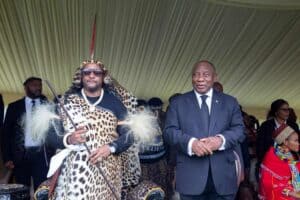While traditional leader found common cause with the ANC and campaigned for the release of Mandela, he’s always been treated with suspicion by the liberation movement.

If Prince Mangosuthu Buthelezi had his way, South Africa’s province in the southeast, with a long shoreline on the Indian Ocean, would today not just be referred to as KwaZulu-Natal, but would be a federal state – a proposal which was defeated at the multi-party Convention for a Democratic South Africa (Codesa).
Concerned about his traditional power being corroded, Buthelezi demanded a federal system of government – guaranteeing respect for the status of traditional Zulu leaders.
In what was seen as been fuelled by the Nationalist Party regime, thousands of people died in violent clashes between his Inkatha Freedom Party (IFP) and ANC supporters in the early 1990s – with mass killings led by marauding Zulu impis witnessed in Boipatong, Thokoza, Swanieville, kwaMakhutha and Shobashobane.
“Third Force” – a term used by ANC leaders during the turbulent times to refer to a clandestine force believed to be responsible for a surge in violence in KwaZulu-Natal and Johannesburg townships – soon became new description of the scourge.
ALSO READ: King Misuzulu cancels reed dance in show of respect for Buthelezi
Once regarded by anti-apartheid political formations as “a traitor” and “sellout”, for abandoning the ANC policy of fighting apartheid employing armed struggle and international sanctions as working tactics, Buthelezi resorted to “fighting from within” – having accepted a role of chief minister of the KwaZulu Bantustan.
Like Transkei, Bophuthatswana, Venda and Ciskei – the TBVC “states” – Buthelezi chose the easy, but non-effective, homeland system as the route to liberate South Africa from the clutches of apartheid.
The Bantustan system was nothing short of the balkanisation of the country along tribal lines – a divide-and-rule strategy which helped the cause of the minority white regime – with Monday 8 11 September 2023 Buthelezi becoming a collaborator.
He broke ties with the ANC in 1979 after clashing with ANC leader Oliver Tambo on the mandate of Inkatha Yenkululeko Yesizwe, which later became the IFP. Tambo wanted Buthelezi to fill the void left by the banning of the ANC – with a movement to unite South Africans under the guise of a cultural movement, Inkatha.
While Buthelezi found common cause with the ANC and campaigned for the release of Nelson Mandela and other political prisoners, he has always been treated with suspicion by the liberation movement, because of his proximity to the apartheid government.
ALSO READ: ‘He wouldn’t want a political spectacle’ – KZN premier calls for ‘peace’ after Buthelezi’s death
During the transition to multi-party democracy, Buthelezi feared the erosion of his power – demanding a more federal system of government, with guarantees that the status of traditional Zulu leaders would be respected.
In a media statement released on 5 September, 1996, the IFP was exonerated from ever planning or authorising acts of violence.
The party claimed to have been “the victim of an African National Congress campaign of aggression, which had sought to isolate and destabilise the organisation in an attempt to ensure its own political dominance”.
But Buthelezi could not deny that individual party members had carried out violent acts.
“Although I have not orchestrated one single act of violence against one single victim of the political violence that has cost us many lives, as the leader of the IFP I know that the buck stops right in front of me,” Buthelezi told a seven-member Truth and Reconciliation Commission panel, hearing his party’s submission on its role in the apartheid conflict.
Whether it will take off or not, Buthelezi died calling for the burying of the hatchet between the IFP and the ANC.
For any real reconciliation to take off, honesty about what happened in South Africa before the 1994 miracle, is key.
Support Local Journalism
Add The Citizen as a Preferred Source on Google and follow us on Google News to see more of our trusted reporting in Google News and Top Stories.






